Fleurs du Mal Magazine


Or see the index
Joanna Klink‘s fifth book begins with poems of personal loss–a tree ripped out by a windstorm, a friendship broken off after decades, the nearing death of parents.
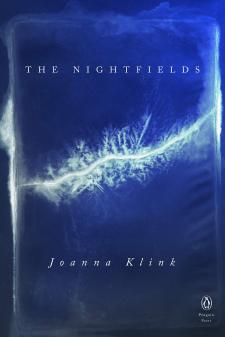 Other poems take on the cost of not loving fully, or are written from bewilderment at the accumulation of losses and at the mercilessness of having, as one ages, to rule things out. There are elegies for friends, and a group of devotional poems.
Other poems take on the cost of not loving fully, or are written from bewilderment at the accumulation of losses and at the mercilessness of having, as one ages, to rule things out. There are elegies for friends, and a group of devotional poems.
The Nightfields closes with thirty-one metaphysical poems inspired by the artist James Turrell’s Roden Crater, an extinct volcano in Arizona that Turrell has been transforming into an observatory for the perception of time. The sequence unfolds as a series of revelations that begin in psychic fear and move gradually toward the possibility of infinitude and connection.
Joanna Klink is the author of five books of poetry. She has received awards and fellowships from the Rona Jaffe Foundation, Jeannette Haien Ballard, Civitella Ranieri, the Bogliasco Foundation, the American Academy of Arts and Letters, the Trust of Amy Lowell, and the John Simon Guggenheim Memorial Foundation. She is teaching at the Michener Center in Austin. Her most recent book, The Nightfields, was published July 7, 2020 by Penguin Books.
( . . . )
When the wind pushes
branches in and out of
shade it is an opening,
as every small gesture
toward another person is
incomprehensibly alive.
Will you be part of the
stoneless passage?
( . . . )
A new collection from a poet whose books “are an amazing experience: harrowing, ravishing, essential, unstoppable” (Louise Glück)
The Nightfields
by Joanna Klink (Author)
Publisher: Penguin Books
July 7, 2020
Language: English
Paperback: 112 pages
ISBN-10: 0143135392
ISBN-13: 978-0143135395
Price: $20.00
• fleursdumal.nl magazine
More in: #Editors Choice Archiv, - Book News, - Bookstores, Archive K-L, Archive K-L
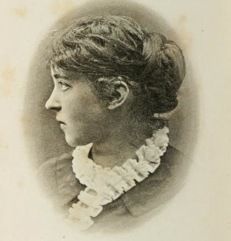
Évolutions
Où sont-ils disparus, les Peuples innombrables,
Autrefois échappés des gouffres du néant.
Pareils aux légions dévorées par les sables
Que la vague dépose au bord de l’Océan ?
Un jour, ils sont venus en conquérants superbes,
Ils ont soumis le globe, ils ont régné sur lui ;
Puis un seul coup de faux qui tranchait le champ d’herbes
Les a plongés soudain dans l’éternelle nuit.
On a vu s’écrouler, leurs pouvoirs séculaires,
Babylone, Ninive, et Thèbes et Memphis ;
Ces cités n’ont laissé que débris éphémères,
Témoins inanimés, argile enseveli.
Dans ces lieux aujourd’hui, vastes déserts stériles,
S’étalaient les splendeurs d’un luxe raffiné.
Et le peuple joyeux qui remplissait les villes
A l’immortalité se croyait destiné.
Il n’a fallu qu’un jour et peut-être qu’une heure
Pour renverser leurs murs, leurs temples et leurs dieux,
Pour faire des palais somptueux la demeure
Des serpents du désert et des oiseaux des cieux.
D’autres ont succédé, rescapés des naufrages ;
D’autres ont recueilli leurs vestiges divers.
Ruines disséminées sur l’Océan des âges,
Épaves d’un vaisseau gisant au fond des mers.
Alors, Art et Science ont entr’ouvert leurs ailes
Comme un aigle superbe au vol capricieux ;
Ils se sont envolés dans des contrées nouvelles
Pour y refaire un nid sous l’éclat d’autres cieux.
Ce fut d’abord l’Asie où l’histoire du monde
Naît sous les verts bosquets de la terre d’Éden,
L’Asie, astre éclatant perçant la nuit profonde
Tel le soleil levant dans l’ombre du matin.
Avec elle l’Afrique et la fertile Égypte
Où le Nil apparaît comme un dieu bienfaisant,
Thèbes et sa nécropole énorme, sombre crypte
D’où les morts assemblés regardaient le présent.
Ils choisirent après, l’Europe, l’Italie,
Ce pays mollement bercé par les flots bleus,
Où, dans le vague écho d’une plainte affaiblie,
L’onde vient expirer sur le sable onduleux.
L’Italie, où semblable à quelque pierre fine
Enchâssée au milieu d’un écrin précieux,
Rome, que soutenait la volonté divine,
Des peuples étonnés éblouissait les yeux.
Elle-même à son tour fut prise et renversée ;
Elle a vu se ternir sa gloire et sa splendeur ;
Ce qu’il reste en ce jour de sa beauté passée
N’est qu’un lointain reflet de sa vieille grandeur.
Puis ce fut tout le Nord de l’Europe ignorée
Qui devint le séjour du savoir et des arts ;
C’est elle maintenant la première contrée,
Et les hommes sur elle attachent leurs regards.
Jusqu’à quand ? — Nul ne sait. Il est un Nouveau Monde
Au-delà des grands flots qui s’accroît jour par jour ;
Sa frontière est immense et sa terre est féconde,
L’Amérique, peut-être, aura demain son tour.
Puis elle passera. — Quelle terre lointaine
Recevra le dépôt par d’autres égaré ?
Dans quelle région, chez quelle race humaine
Luiront encor les feux de ce flambeau sacré ?
Oui ! dans quelque mille ans, dans moins longtemps peut-être,
Où seront nos palais, nos empires, nos lois ? —
Le Temps, ce niveleur farouche, ce grand maître,
Aura tout transformé pour la centième fois.
Et nos belles cités dont nous nous faisons gloire,
Où devaient à toujours se succéder nos fils,
Ne seront plus qu’un rêve à la triste mémoire,
Comme vous, ô Ninive, ô Thèbes, ô Memphis !
Bevaix, 28 août 1882
Alice De Chambrier
(1861-1882)
Évolutions
• fleursdumal.nl magazine
More in: Alice De Chambrier, Archive C-D, Archive C-D, Chambrier, Alice De

Just A Woman
You ask me why I love her;
Not a charm can you discover!
Would you see
The heart that a shut rose is,
And whose beauty ne’er uncloses
Save for me?
She is not rich or clever,
But her speeches thrill me ever,
And with bliss
My heart her whisper flutters,
Though the wisest word she utters
Is a kiss.
All evil things have shunned her,
And with a wide-eyed wonder
Is she tasked,
What lavish god has given
In her earth so much of heaven
All unasked?
She has no gifts or graces,
But the gladness in her face is
Sought of kings;
She cannot chant a measure,
But her heart with a grave pleasure
Ever sings.
Her gown is of the whitest
But the hem is soiled the slightest:
Little worth,
She has no wings to fly with,
And she prefers to hie with
Me on earth.
There is no hint of heaven
Or glimpse of deep thought even
In her eyes;
She is warm and she is human,
Just a weak and wilful woman —
Not too wise.
Her thousand beauties singing,
I have not said how clinging
Are her arms;
But, not loved and not the lover
Dare you ever hope discover
Half her charms?
Arthur Adams
(1872-1936)
Just A Woman
• fleursdumal.nl magazine
More in: Adams, Arthur, Archive A-B, Archive A-B, THEATRE
Kaveh Akbar’s exquisite, highly anticipated follow-up to Calling a Wolf a Wolf.
 With formal virtuosity and ruthless precision, Kaveh Akbar’s second collection takes its readers on a spiritual journey of disavowal, fiercely attendant to the presence of divinity where artifacts of self and belonging have been shed. How does one recover from addiction without destroying the self-as-addict?
With formal virtuosity and ruthless precision, Kaveh Akbar’s second collection takes its readers on a spiritual journey of disavowal, fiercely attendant to the presence of divinity where artifacts of self and belonging have been shed. How does one recover from addiction without destroying the self-as-addict?
And if living justly in a nation that would see them erased is, too, a kind of self-destruction, what does one do with the body’s question, “what now shall I repair?” Here, Akbar responds with prayer as an act of devotion to dissonance―the infinite void of a loved one’s absence, the indulgence of austerity, making a life as a Muslim in an Islamophobic nation―teasing the sacred out of silence and stillness.
Richly crafted and generous, Pilgrim Bell’s linguistic rigor is tuned to the register of this moment and any moment. As the swinging soul crashes into its limits, against the atrocities of the American empire, and through a profoundly human capacity for cruelty and grace, these brilliant poems dare to exist in the empty space where song lives―resonant, revelatory, and holy.
Kaveh Akbar founded and edits Divedapper, where he interviews major voices in contemporary poetry. His poems have appeared in The New Yorker, Poetry, Tin House, APR, PBS NewsHour, and elsewhere. He is the author of the chapbook Portrait of the Alcoholic (Sibling Rivalry Press, January 2017) and full-length collection Calling a Wolf a Wolf (Alice James Books, September 2017). Akbar has received a Pushcart and a Lucille Medwick Memorial Award from the Poetry Society of America. In 2016, Akbar was a recipient of the Ruth Lilly and Dorothy Sargent Rosenberg Poetry Fellowship from the Poetry Foundation. He was born in Tehran, Iran, and is currently a professor in the MFA program at Purdue University and in the low-residency program at Randolph College.
(. . .)
Corporeal friends are
spiritual enemies, said
Blake, probably gardening
in the nude. Today I’m trying
to scowl more, mismatch
my lingerie. Nobody
seems bothered enough.
(. . .)
Pilgrim Bell
Poems
by Kaveh Akbar
Publisher: Graywolf Press
August 3, 2021
Language: English
Paperback
80 pages
ISBN-10 : 1644450593
ISBN-13 : 978-1644450598
$13.70
• fleursdumal.nl magazine
More in: #Editors Choice Archiv, - Book News, - Bookstores, Archive A-B, Archive A-B
The definitive anthology of Jim Morrison‘s writings with rare photographs and numerous handwritten excerpts of unpublished and published poetry and lyrics from his 28 privately held notebooks.
 You can also hear Jim Morrison’s final poetry recording, now available for the first time, on the CD or digital audio edition of this book, at the Village Recorder in West Los Angeles on his twenty-seventh birthday, December 8, 1970.
You can also hear Jim Morrison’s final poetry recording, now available for the first time, on the CD or digital audio edition of this book, at the Village Recorder in West Los Angeles on his twenty-seventh birthday, December 8, 1970.
The audio book also includes performances by Patti Smith, Oliver Ray, Liz Phair, Tom Robbins, and others reading Morrison’s work.
Created in collaboration with Jim Morrison’s estate and inspired by a posthumously discovered list entitled “Plan for Book,”
The Collected Works of Jim Morrison is an almost 600-page anthology of the writings of the late poet and iconic Doors’ front man. This landmark publication is the definitive opus of Morrison’s creative output—and the book he intended to publish. Throughout, a compelling mix of 160 visual components accompanies the text, which includes numerous excerpts from his 28 privately held notebooks—all written in his own hand and published here for the first time—as well as an array of personal images and commentary on the work by Morrison himself.
 This oversized, beautifully produced collectible volume contains a wealth of new material—poetry, writings, lyrics, and audio transcripts of Morrison reading his work.
This oversized, beautifully produced collectible volume contains a wealth of new material—poetry, writings, lyrics, and audio transcripts of Morrison reading his work.
Not only the most comprehensive book of Morrison’s work ever published, it is immersive, giving readers insight to the creative process of and offering access to the musings and observations of an artist whom the poet Michael McClure called “one of the finest, clearest spirits of our times.”
This remarkable collector’s item includes:
• Foreword by Tom Robbins; introduction and notes by editor Frank Lisciandro that provide insight to the work; prologue by Anne Morrison Chewning
• Published and unpublished work and a vast selection of notebook writings
• The transcript, the only photographs in existence, and production notes of Morrison’s last poetry recording on his twenty-seventh birthday
• The Paris notebook, possibly Morrison’s final journal, reproduced at full reading size
• Excerpts from notebooks kept during his 1970 Miami trial
• The shooting script and gorgeous color stills from the never-released film HWY
• Complete published a I Look Back”: a compelling autobiography in poem form
• Family photographs as well as images of Morrison during his years as a performer
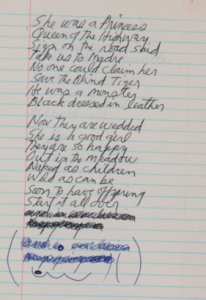
James Douglas Morrison
(1943-1971) was a poet, filmmaker, screenwriter, and the lead singer of as well as the lyricist and a composer for The Doors. Prior to his death, Morrison self-published three limited-edition volumes of his poetry: The Lords/Notes on Vision (1969), The New Creatures (1969), and An American Prayer (1970). Simon & Schuster published the combined The Lords and the New Creatures in 1970. Posthumous editions of Morrison’s writings include Wilderness: The Lost Writings of Jim Morrison, Volume I (1988) and The American Night: The Lost Writings of Jim Morrison, Volume II (1990).
The Collected Works of Jim Morrison
Poetry, Journals, Transcripts, and Lyrics
By Jim Morrison, Foreword by Tom Robbins
On Sale: June 8, 2021
Publisher: Harper Design
Language: English
Hardcover: 584 pages
ISBN-10 : 0063028972
ISBN-13 : 978-0063028975
Item Weight: 4.44 pounds
Dimensions: 7.7 x 2 x 10.6 inches
$39.99
The Collected Works of Jim Morrison
CD: Poetry, Journals, Transcripts, and Lyrics
Audio CD – Unabridged.
Performed by Jim Morrison, Patti Smith, Liz Phair, Oliver Ray, Tom Robbins, Frank Lisciandro, Anne Morrison Chewning, Sefton Graham, and Ian Morrison.
Includes Jim Morrison’s final poetry recording, now available for the first time, at the Village Recorder in West Los Angeles on his 27th birthday, December 8, 1970.
Audio CD
$23.99
• fleursdumal.nl magazine
More in: #Archive A-Z Sound Poetry, #Editors Choice Archiv, Archive M-N, Archive M-N, AUDIO, CINEMA, RADIO & TV, Jim Morrison

Little Red Riding-Hood
If you listen, children, I will tell
The story of little Red Riding-hood:
Such wonderful, wonderful things befell
Her and her grandmother, old and good
(So old she was never very well),
Who lived in a cottage in a wood.
Little Red Riding-hood, every day,
Whatever the weather, shine or storm,
To see her grandmother tripped away,
With a scarlet hood to keep her warm,
And a little mantle, soft and gay,
And a basket of goodies on her arm.
A pat of butter, and cakes of cheese,
Were stored in the napkin, nice and neat;
As she danced along beneath the trees,
As light as a shadow were her feet;
And she hummed such tunes as the bumble-bees
Hum when the clover-tops are sweet.
But an ugly wolf by chance espied
The child, and marked her for his prize.
“What are you carrying there?” he cried;
“Is it some fresh-baked cakes and pies?”
And he walked along close by her side,
And sniffed and rolled his hungry eyes.
“A basket of things for granny, it is,”
She answered brightly, without fear.
“Oh, I know her very well, sweet miss!
Two roads branch towards her cottage here;
You go that way, and I’ll go this.
See which will get there first, my dear!”
He fled to the cottage, swift and sly;
Rapped softly, with a dreadful grin.
“Who’s there?” asked granny. “Only I!”
Piping his voice up high and thin.
“Pull the string, and the latch will fly!”
Old granny said; and he went in.
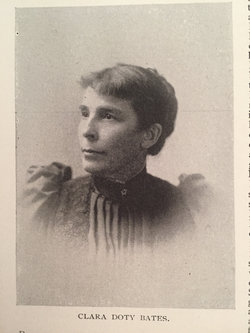
He glared her over from foot to head;
In a second more the thing was done!
He gobbled her up, and merely said,
“She wasn’t a very tender one!”
And then he jumped into the bed,
And put her sack and night-cap on.
And he heard soft footsteps presently,
And then on the door a timid rap;
He knew Red Riding-hood was shy,
So he answered faintly to the tap:
“Pull the string and the latch will fly!”
She did: and granny, in her night-cap,
Lay covered almost up to her nose.
“Oh, granny dear!” she cried, “are you worse?”
“I’m all of a shiver, even to my toes!
Please won’t you be my little nurse,
And snug up tight here under the clothes?”
Red Riding-hood answered, “Yes,” of course.
Her innocent head on the pillow laid,
She spied great pricked-up, hairy ears,
And a fierce great mouth, wide open spread,
And green eyes, filled with wicked leers;
And all of a sudden she grew afraid;
Yet she softly asked, in spite of her fears:
“Oh, granny! what makes your ears so big?”
“To hear you with! to hear you with!”
“Oh, granny! what make your eyes so big?”
“To see you with! to see you with!”
“Oh, granny! what makes your teeth so big?”
“To eat you with! to eat you with!”
And he sprang to swallow her up alive;
But it chanced a woodman from the wood,
Hearing her shriek, rushed, with his knife,
And drenched the wolf in his own blood.
And in that way he saved the life
Of pretty little Red Riding-hood.
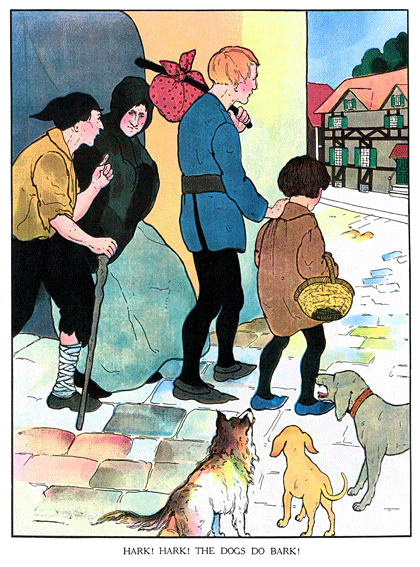
Hark, hark
The dogs do bark
Beggars are coming to town;
Some in jags,
Some in rags,
And some in velvet gowns.
Clara Doty Bates
(1838 – 1895)
Little Red Riding-Hood
Versified by Mrs. Clara Doty Bates
fleursdumal.nl magazine
More in: Archive A-B, Archive A-B, Bates, Clara Doty, Children's Poetry, Grimm, Andersen e.o.: Fables, Fairy Tales & Stories, Tales of Mystery & Imagination
Lana Del Rey follows in the same musician/poet footsteps as Joni Mitchell, Leonard Cohen, Jewel and Lou Reed.
 Lana’s music and lyrics evoke images of a saturated Kodachrome photograph, so it would stand to reason that she’d now add “poet” to her artist’s kit. Even without music, her words work their way around you, pulling you into a world that’s not unlike a David Lynch movie.
Lana’s music and lyrics evoke images of a saturated Kodachrome photograph, so it would stand to reason that she’d now add “poet” to her artist’s kit. Even without music, her words work their way around you, pulling you into a world that’s not unlike a David Lynch movie.
The New York Times bestselling debut book of poetry from Lana Del Rey, Violet Bent Backwards Over the Grass.
“Violet Bent Backwards Over the Grass is the title poem of the book and the first poem I wrote of many. Some of which came to me in their entirety, which I dictated and then typed out, and some that I worked laboriously picking apart each word to make the perfect poem. They are eclectic and honest and not trying to be anything other than what they are and for that reason I’m proud of them, especially because the spirit in which they were written was very authentic.” —Lana Del Rey
Lana’s breathtaking first book solidifies her further as “the essential writer of her times” (The Atlantic). The collection features more than thirty poems, many exclusive to the book: Never to Heaven, The Land of 1,000 Fires, Past the Bushes Cypress Thriving, LA Who Am I to Love You?, Tessa DiPietro, Happy, Paradise Is Very Fragile, Bare Feet on Linoleum, and many more. This beautiful hardcover edition showcases Lana’s typewritten manuscript pages alongside her original photography. The result is an extraordinary poetic landscape that reflects the unguarded spirit of its creator.
Violet Bent Backwards Over the Grass is also brought to life in an unprecedented spoken word audiobook which features Lana Del Rey reading fourteen select poems from the book accompanied by music from Grammy Award–winning musician Jack Antonoff.
Lana Del Rey is an American singer, songwriter, artist, and poet. Violet Bent Backwards Over the Grass is her first book.
Violet Bent Backwards over the Grass
by Lana Del Rey
Poetry
English language
Publisher: Simon & Schuster
Publication date: 09/29/2020
ISBN-13: 9781982167288
Pages: 128
Hardcover
$24.99
• fleursdumal.nl magazine
More in: # Music Archive, #Editors Choice Archiv, Archive C-D, Archive C-D, Lana Del Rey
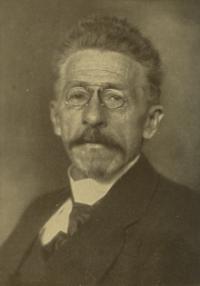
“Hab’ Sonne im Herzen”
Hab’ Sonne im Herzen, obs stürmt oder schneit
Ob der Himmel voll Wolken, die Erd voller Streit.
Hab’ Sonne im Herzen, dann komme was mag,
das leuchtet voll Licht dir den dunkelsten Tag.
Hab’ ein Lied auf den Lippen mit fröhlichem Klang
und macht auch des Alltags Gedränge dich bang!
Hab’ ein Lied auf den Lippen, dann komme was mag,
das hilft dir verwinden den einsamsten Tag!
Hab’ ein Wort auch für andre in Sorg’ und in Pein,
und sag, was dich selber so frohgemut lässt sein:
Hab’ ein Lied auf den Lippen, verlier nie den Mut,
hab’ Sonne im Herzen, und alles wird gut.
Cäsar Flaischlen
(1864-1920)
“Hab’ Sonne im Herzen”
• fleursdumal.nl magazine
More in: # Classic Poetry Archive, Archive E-F, Archive E-F

Females
The female fox she is a fox;
The female whale a whale;
The female eagle holds her place
As representative of race
As truly as the male.
The mother hen doth scratch for her chicks,
And scratch for herself beside;
The mother cow doth nurse her calf,
Yet fares as well as her other half
In the pasture free and wide.
The female bird doth soar in air;
The female fish doth swim;
The fleet-foot mare upon the course
Doth hold her own with the flying horse–
Yea and she beateth him!
One female in the world we find
Telling a different tale.
It is the female of our race,
Who holds a parasitic place
Dependent on the male.
Not so, saith she, ye slander me!
No parasite am I.
I earn my living as a wife;
My children take my very life;
Why should I share in human strife,
To plant and build and buy?
The human race holds highest place
In all the world so wide,
Yet these inferior females wive,
And raise their little ones alive,
And feed themselves beside.
The race is higher than the sex,
Though sex be fair and good;
A Human Creature is your state,
And to be human is more great
Than even womanhood!
The female fox she is a fox;
The female whale a whale;
The female eagle holds her place
As representative of race
As truly as the male.
Charlotte Perkins Gilman
(1860-1935)
Females
Suffrage Songs and Verses
• fleursdumal.nl magazine
More in: # Classic Poetry Archive, Archive G-H, Archive G-H, Feminism
Soms humoristisch, soms zakelijk, maar altijd in een volstrekt eigen vorm. De poëzie van Alfred Schaffer wordt alom geroemd om haar meerstemmigheid en schakelt moeiteloos tussen engagement en absurditeit.
 Schaffer ontving de P.C. Hooft-prijs 2021 en is daarmee een van de jongste laureaten ooit van Nederlands belangrijkste literaire oeuvreprijs. Sinds zijn debuutbundel Zijn opkomst in de voorstad (2000), die werd bekroond met de eerste Jo Peters Poëzieprijs, weet Schaffer zich constant te vernieuwen, met het vol lof onthaalde wie was ik. strafregels (2020) als meest recente uiting van zijn virtuoze dichterschap.
Schaffer ontving de P.C. Hooft-prijs 2021 en is daarmee een van de jongste laureaten ooit van Nederlands belangrijkste literaire oeuvreprijs. Sinds zijn debuutbundel Zijn opkomst in de voorstad (2000), die werd bekroond met de eerste Jo Peters Poëzieprijs, weet Schaffer zich constant te vernieuwen, met het vol lof onthaalde wie was ik. strafregels (2020) als meest recente uiting van zijn virtuoze dichterschap.
Zo heb ik u lief. alle gedichten tot nu toe brengt twintig jaar dichterschap en negen bundels samen in één band en laat zien dat Schaffer ontegenzeggelijk een van de beste hedendaagse dichters in het Nederlandse taalgebied is.
Alfred Schaffer (1973) is dichter, docent en vertaler. Hij studeerde Nederlandse Taal- en Letterkunde en Film- en Theaterwetenschappen alvorens in 1996 naar Zuid-Afrika te verhuizen, waar hij als docent verbonden was aan de Universiteit van Kaapstad. Tussen 2007 en 2010 was hij fondsredacteur van De Bezige Bij. In 2011 vertrok hij opnieuw naar Zuid-Afrika, waar hij doceert aan de Universiteit van Stellenbosch.
Nog niet verschenen. Reserveer het boek nu bij uw boekhandel. Het boek verschijnt rond 02-09-2021.
Zo heb ik u lief
Alle gedichten tot nu toe
Auteur: Alfred Schaffer
ISBN: 9789403141213
NUR: 306
Paperback
Aantal pagina’s: 736
Uitgever: De Bezige Bij
Verschijningsdatum: 02-09-2021
Prijs: 34,99
• fleursdumal.nl magazine
More in: #Modern Poetry Archive, Archive S-T, Archive S-T
Diane Seuss writes in this brilliant, candid work, her most personal collection to date.
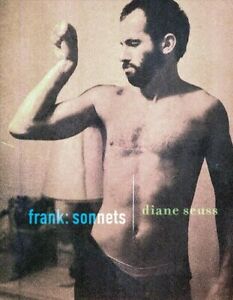 These poems tell the story of a life at risk of spilling over the edge of the page, from Seuss’s working-class childhood in rural Michigan to the dangerous allures of New York City and back again.
These poems tell the story of a life at risk of spilling over the edge of the page, from Seuss’s working-class childhood in rural Michigan to the dangerous allures of New York City and back again.
With sheer virtuosity, Seuss moves nimbly across thought and time, poetry and punk, AIDS and addiction, Christ and motherhood, showing us what we can do, what we can do without, and what we offer to one another when we have nothing left to spare.
Like a series of cels on a filmstrip, frank: sonnets captures the magnitude of a life lived honestly, a restless search for some kind of “beauty or relief.” Seuss is at the height of her powers, devastatingly astute, austere, and―in a word―frank.
“The sonnet, like poverty, teaches you what you can do / without,”
# New Poetry
frank: sonnets
by Diane Seuss
Publisher: Graywolf Press
March 2, 2021
Language: English
Paperback
152 pages
ISBN-10: 1644450453
ISBN-13: 978-1644450451
$15.99
• fleursdumal.nl magazine
More in: #Modern Poetry Archive, Archive S-T, Archive S-T

Time-Stone
Hallo, Metropolitan –
Ubiquitous windows staring all ways,
Red eye notching the darkness.
No use to ogle that slip of a moon.
This midnight the moon,
Playing virgin after all her encounters,
Will break another date with you.
You fuss an awful lot,
You flight of ledger books,
Overrun with multiple ant-black figures
Dancing on spindle legs
An interminable can-can.
But I’d rather… like the cats in the alley… count time
By the silver whistle of a moonbeam
Falling between my stoop-shouldered walls,
Than all your tally of the sunsets,
Metropolitan, ticking among stars.
Lola Ridge
(1873-1941)
Time-Stone
• fleursdumal.nl magazine
More in: Archive Q-R, Archive Q-R, Ridge, Lola
Thank you for reading Fleurs du Mal - magazine for art & literature